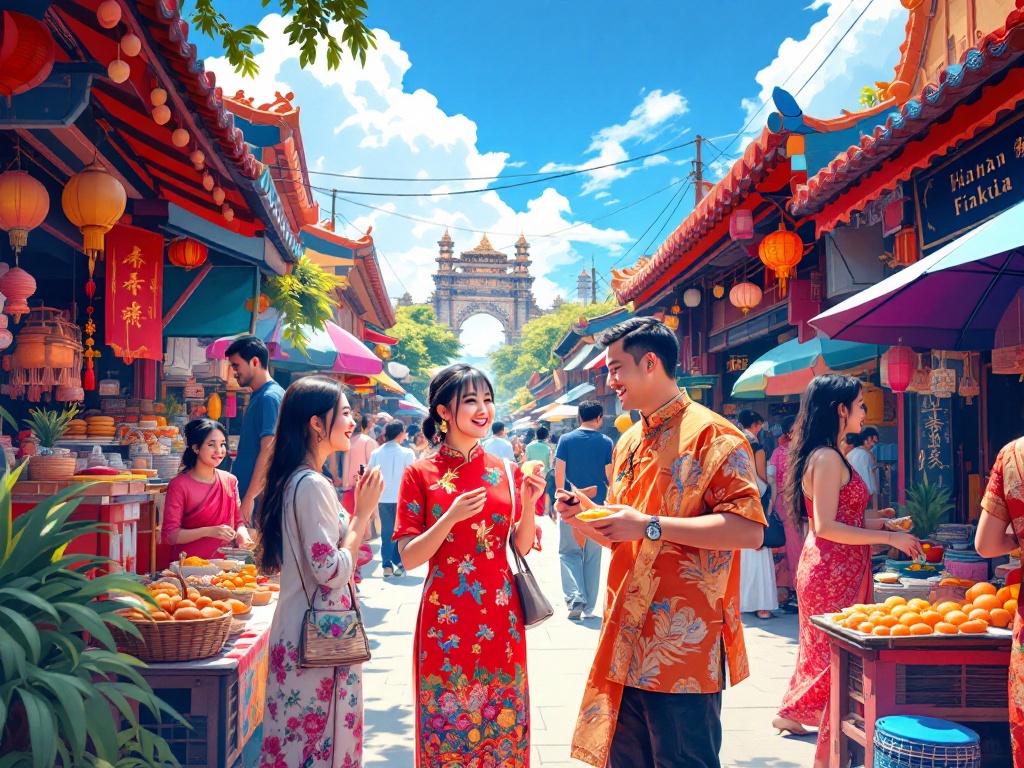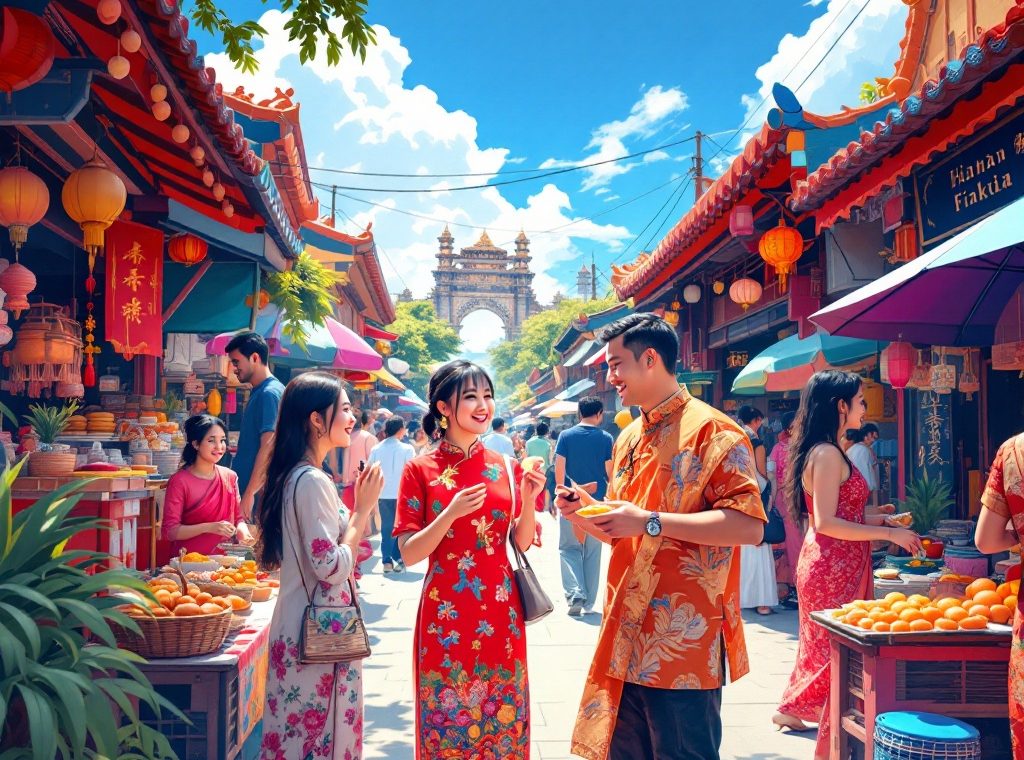Local Customs and Etiquette in Malaysia
Planning a trip to Malaysia? Immerse yourself in the rich culture by understanding local customs. From respecting elders and proper dining etiquette to appropriate gift-giving and modest attire, learn how to navigate social interactions seamlessly. Discover the nuances of Malay, Chinese, and Indian traditions to enrich your Malaysian experience and build lasting connections. Dive in and unlock the secrets to a truly memorable journey!
Important information

- Show respect to elders.
- Use your right hand for eating, giving, and receiving.
- Dress modestly, especially at religious sites.
- Remove your shoes before entering homes and mosques.
- Avoid public displays of affection.
Understanding Local Customs and Etiquette in Malaysia
Experiencing Malaysia fully means embracing its unique blend of Malay, Chinese, and Indian customs. Showing respect for elders is paramount, and public displays of affection should be avoided. Mealtimes offer a glimpse into local etiquette: always eat with your right hand and graciously accept any food offered. Gift-giving follows a similar protocol; present and receive with your right hand, remembering to avoid gifts of alcohol or pork. Modest attire is appreciated, particularly when visiting religious sites. Finally, remember to remove your shoes before entering a home.
Respect Elders. Showing respect for elders is a cornerstone of Malaysian culture.
Public Displays of Affection. Avoid public displays of affection as they are generally frowned upon.
Mealtime Etiquette. Always eat with your right hand and graciously accept any food offered.
Gift-Giving Etiquette. Present and receive gifts with your right hand, avoiding alcohol or pork.
Modest Attire. Dress modestly, especially when visiting religious sites.
Footwear Etiquette. Remove your shoes before entering someone’s home.
By observing these simple courtesies, you’ll enrich your Malaysian adventure and create lasting memories. Before you travel to Malaysia, remember to apply for the Malaysia Digital Arrival Card, a requirement for entry. You can find more information and apply at Malaysia Digital Arrival Card.
The Importance of Local Norms
When traveling, show respect by embracing local customs. In Malaysia, this includes removing your shoes at the doorway and often eating with your hands. Interestingly, silence plays a significant role in Malaysian communication, demonstrating a nuanced cultural sensitivity.
Polite Behavior in Malaysian Culture
Politeness is essential in Malaysia. Show respect to elders, offer proper greetings, and observe local customs. A smile can make a big difference. Accepting offered food is a sign of courtesy. Dress modestly, especially when visiting religious sites. Public displays of affection are best avoided. Use your right hand for dining and giving or receiving items. Remember to remove your shoes before entering someone’s home.
Key Aspects of Malaysian Etiquette:
- Show respect to elders.
- Offer proper greetings.
- Observe local customs.
- Smile often.
- Accept offered food.
Important Cultural Norms:
- Dress modestly, especially at religious sites.
- Avoid public displays of affection.
- Use your right hand for dining and exchanges.
- Remove shoes before entering homes.
Malaysia is a multi-ethnic nation with Malay, Chinese, and Indian customs, each having unique nuances. Be mindful of these cultural differences. Sensitive topics like politics and religion are generally best avoided in conversation.
Social Behavior and Cultural Diversity
Malaysians are renowned for their politeness and remarkable hospitality, often going the extra mile for visitors. For instance, they may inquire about personal matters such as marital status, religion, or family details—not out of prying curiosity, but as a genuine expression of interest and a way to build rapport. Compliments are also freely exchanged, creating a warm and welcoming atmosphere. Ultimately, Malaysians place a high value on amicable interactions.
Politeness and Helping Nature of Malaysians
Malaysians are known for their politeness, helpfulness, and kindness, often offering assistance genuinely. Sincere compliments are highly valued in their culture, fostering positive interactions. Courtesy and kindness are prized Malaysian traits.
Handling Personal Questions
In Malaysia, inquiring about personal matters demonstrates genuine interest and fosters friendship. Polite responses, even brief ones, strengthen these bonds. If a question feels too intrusive, a simple smile and a subject change gracefully deflects it while preserving both courtesy and privacy.
Compliments and Their Reception
Malaysians appreciate sincere praise, particularly compliments about their hospitality. False flattery can be detrimental, eroding trust. Genuine admiration, conversely, fosters stronger relationships and builds authentic connections.
Greetings and Communication Customs
Malaysian greetings vary based on ethnicity. Malay men usually greet with a “salaam” (double handshake), while women may only shake hands if a man initiates. Chinese Malaysians often prefer a light handshake, and Indian Malaysians typically shake hands with the same sex and nod to the opposite sex. Using formal titles (Mr., Mrs., Miss) shows respect.Non-verbal cues are important in Malaysia. Indirect communication helps people maintain face. A direct “no” is often replaced with “I will try,” and a pause before responding shows consideration. Open anger is avoided, and laughter can mask discomfort.Silence signifies thoughtfulness and respect. Avoid interrupting pauses, as they are crucial for communication. Hasty responses can seem disrespectful. Modesty, especially in rural areas, is highly valued.Cultural and religious norms shape social interactions. Women dress modestly, and men shouldn’t initiate physical contact with women. Respecting these customs builds positive relationships.
Meeting and Greeting Etiquette
Malaysian greetings prioritize respect and vary based on gender. Traditionally, men greet each other with a “salaam,” resembling a double handshake. When greeting women or elders, a slight bow or nod is customary. Men usually avoid initiating a handshake with a woman, but reciprocating one offered by a woman is polite.
Non-verbal Communication and Body Language
In Malaysia, nonverbal communication is crucial. To avoid conflict, Malaysians often communicate indirectly. A thoughtful pause before responding is common. Open displays of anger are discouraged, and laughter sometimes masks discomfort.
Demonstrating respectful body language signals cultural sensitivity. Ultimately, understanding nonverbal cues is essential for successfully navigating Malaysian interactions.
The Role of Silence in Conversations
In Malaysia, conversational pauses are common. Silence often indicates thoughtful consideration before responding, not disagreement or disinterest.
Respect and Gender Interactions
In Malaysia, cultural and religious beliefs influence how men and women interact. Handshakes between opposite genders are uncommon, and maintaining a respectful distance is customary. Some Malaysians may be uncomfortable with close interactions between genders. Visitors should respect these customs and personal space.
Religious and Cultural Sensitivities
Respecting local customs is vital when visiting Malaysia. Islam is the official religion, so observing Islamic customs is essential. Malaysia’s diverse culture also embraces Malay, Chinese, and Indian traditions. Public displays of affection are generally discouraged. Dress modestly when visiting religious sites, such as mosques and temples. Observe specific guidelines for each location to demonstrate respect.
Respect for Islamic Principles
When visiting religious sites, dress respectfully in modest attire, avoiding anything too revealing. Remember that Islam prohibits pork and alcohol, so look for halal food options. If you’re visiting during Ramadan, refrain from eating or drinking publicly during daylight hours. It’s generally best to avoid public displays of affection. When greeting someone, offer your right hand, and use the same hand for giving or receiving items, as the left hand is traditionally considered unclean. Finally, remember to remove your shoes before entering a mosque or someone’s home.
Dress respectfully in modest attire, avoiding anything too revealing.
Look for halal food options, as Islam prohibits pork and alcohol.
If visiting during Ramadan, refrain from eating or drinking publicly during daylight hours.
Avoid public displays of affection.
When greeting someone, offer your right hand.
Use your right hand for giving or receiving items, as the left hand is traditionally considered unclean.
Remove your shoes before entering a mosque or someone’s home.
Understanding Different Ethnic Traditions
Malaysia’s diverse population, including Malay, Chinese, Indian, and Indigenous groups, creates a vibrant cultural tapestry. Each ethnicity contributes unique traditions, especially in gift-giving customs.
Malay
During Eid al-Fitr, Malays exchange gifts, often green packets of money.
Chinese Malaysian
Chinese New Year is celebrated with mandarin oranges and red envelopes filled with cash.
Indian
Indians typically gift sweets and other presents for Diwali.
Indigenous Groups
They have rich traditions connected to specific festivals and ceremonies, resulting in diverse gift-giving practices.
Public Displays of Affection and Cultural Norms
Public displays of affection are generally discouraged in Malaysia. While holding hands is sometimes acceptable, kissing is considered disrespectful. This custom stems from Malaysia’s traditional Islamic values.
Visiting Mosques and Temples
Visiting Malaysian mosques and temples requires respectful attire and behavior. For men, this means wearing long pants and shirts with sleeves. Women should ensure their arms and legs are covered, and often a headscarf is required in mosques, and sometimes temples. Shoes must always be removed before entering any religious site.
Inside Mosques and Temples
Maintain a respectful silence, especially during prayer times. Avoid walking in front of worshippers and refrain from touching religious artifacts. Photography may be restricted, so it’s always best to ask permission beforehand. Non-Muslims may not be permitted inside mosques during prayer.
Temple Visiting Hours
Temples generally welcome visitors throughout the day. By following these guidelines, you demonstrate respect for local customs and traditions, ensuring a positive cultural experience.
Dining and Eating Customs
Dining etiquette in Malaysia centers around politeness and respect. Observe these customs for a positive cultural experience: Always eat with your right hand, especially when utensils aren’t provided, ensuring it’s thoroughly clean beforehand. Dishes are usually served in bite-sized pieces for easy consumption. Refrain from using your left hand for eating or passing food.
When dining out, the host usually orders the meal. It is polite to leave a small portion of food on your plate at the end of the meal. This signals your satisfaction with the meal. Finishing everything can imply you are still hungry.
It’s considered impolite to eat while walking. While generally, it’s good manners to clear your plate, leaving a little food when eating at someone’s home shows contentment and appreciation. Be mindful of dietary restrictions, as some Malaysians abstain from pork or beef for religious reasons.
Using Hands for Eating
In Malaysia, it’s customary to eat with your right hand—many even prefer it to using utensils. Be sure to wash thoroughly beforehand. Traditionally, using the left hand is considered impolite.
Clearing Your Plate: A Sign of Respect
In Malaysia, an empty plate signifies appreciation for both the meal and the host’s generosity. It’s a simple way to acknowledge their efforts and thank them for the work involved in preparing the food.
Food Customs and Halal Standards
Halal food adheres to Islamic dietary guidelines. Sharing meals is a treasured tradition in Malaysia. Malaysians often eat with their right hand, as using the left is considered disrespectful.
Refusing Food: A Cultural Faux-Pas
Accepting food from a Malaysian host is a significant cultural practice. When offered food, even a small portion, accepting it shows respect and strengthens the bond with your host. Declining food can be seen as impolite, so always accept a little food as a crucial part of Malaysian etiquette.
Gift Giving and Receiving Etiquette
Gift-Giving Etiquette in Malaysia
Presenting gifts in Malaysia involves specific cultural nuances. Show respect by using both hands, or your right hand if necessary, as the left hand is considered unclean. A polite initial refusal is a sign of humility, not rejection. Gifts are usually opened privately, not in the giver’s presence.
Choosing the Right Gift
Thoughtful gift selection is crucial. Avoid inappropriate gifts such as alcohol, pork products, knives, scissors, and images of dogs. Consider company merchandise or items from your home country. When gifting money to Indian recipients, opt for odd denominations. For Chinese recipients, refrain from using white or black wrapping paper. A small gift for the host is customary during home visits.
Offering Buah Tangan
In Malaysia, presenting a small gift, known as “buah tangan,” is a customary way to show respect and appreciation for your host. Common gifts include fruits, sweets, or snacks. This thoughtful gesture not only acknowledges the host’s hospitality but also strengthens social bonds. Therefore, when visiting a Malaysian home, consider bringing a small token of appreciation to demonstrate your care.
Gift Presentation and Receiving Protocols
When exchanging gifts in Malaysia, use both hands to show respect. It’s customary to politely decline a gift at first, then graciously accept it. Avoid opening the present in front of the giver.
Appropriate and Inappropriate Gifts
When selecting a gift from your homeland, consider items like local crafts, food specialties, or small souvenirs. These thoughtful gestures are always appreciated. It’s best to avoid gifts such as alcohol, pork products (including pigskin), knives, or other sharp objects, as these are generally considered inappropriate. Giving money is also not customary.
Wrapping Gifts: Color Considerations
When choosing gift wrap in Malaysia, avoid colors associated with mourning, such as black, white, or blue. Instead, select festive colors like red, yellow, green, or pink to show cultural sensitivity. Consider the recipient’s background as well. Red and pink are especially favored for gifts to Chinese Malaysians, symbolizing good luck.
Visiting Customs and Hospitality
In Malaysia, removing your shoes before entering a home is a sign of respect. This small gesture conveys a great deal.
Punctuality is appreciated when visiting, though minor delays are generally acceptable. Modest attire, especially in rural areas, demonstrates cultural awareness and honors local traditions.
Removal of Shoes Before Entering Homes
In Malaysia, it’s customary to remove your shoes at the entrance of a home as a sign of respect. This practice extends to everyone, including residents and visitors.
Punctuality and Social Visits
In Malaysia, personal connections are valued over strict timelines. While arriving precisely on time for social events isn’t crucial, and unforeseen delays are tolerated, business meetings require punctuality. Tardiness to a client meeting, for instance, could be perceived as disrespectful. Therefore, confirming arrival times beforehand is always recommended. Here’s a simple guideline for navigating time in Malaysia:
Social Events
Flexibility is key. Arriving a little late is generally acceptable.
Business Meetings
Punctuality is essential. Confirming arrival times beforehand demonstrates respect and professionalism.
Dressing Respectfully in Rural Areas
When visiting rural Malaysia, modest attire demonstrates respect for local customs. Women might choose longer skirts or pants and cover their shoulders. Men typically wear long pants and shirts. This simple gesture honors the community and its traditions.









